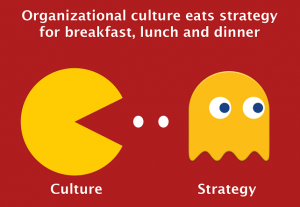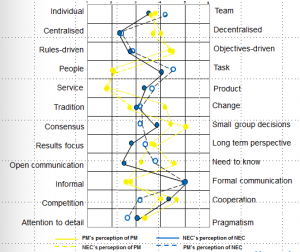The success of a project is certainly due in part to the skills and training of the project manager as well as the scaleable measuring tools used to gauge progress. However, in this Tech Republic article, author Tom Mochal makes the point that regardless of how well-equipped a project manager is, the success of an initiative rises and falls in part due to the existing organization culture. How does culture influence a project? Perhaps the organization has a history of starting projects and not seeing them through to the end. Over time this could develop a pessimistic careless attitude among employees towards the introduction of new initiatives. The organizational structure matters as well, dictating how, where, and when people spend their time at work on a project. Mochal notes that while structure can change, culture is nearly impenetrable in the short run. This brings to mind the case we just discussed in class with an employee pulled between two task forces. Multitasking rarely improves a process, but rather splits attentions to 50% “power.”
I have personally experienced the roadblocks of inbred organizational cultural mentalities, especially the lack of compliance and urgency in the final stages of project implementation. My volunteer team was working to analyze the supply chain (and reduce costs) of a bakery whose proceeds were largely donated to a cause. The bakery was financially in the red and had been for years, but the first priority was always the cause; this was evident when you talked to the employees. In fact, the bakery had never undergone a full financial analysis. The request for the project came from top management and we met with them to discuss the project scope and timeline. However, as we began to search for the data necessary to complete our initial analysis, we met resistance from middle management who vocalized their doubts about the project. They had seen other projects start and fail numerous times and were not willing to invest the time to see this project succeed. The top management and middle management additionally had not engaged in any communications concerning the project. When we met with middle management to ask for the data, it was the first time they had heard of the project and would not relinquish the data to us initially. These are only a few examples of our representative experience with the bakery, but it does serve as a poignant reminder that as a project manager, you can have the skills, the tools and the vision, but without the support of the people within the organization who will be affected by your project implementation, every step you take will be in vain.
Have you experienced or witnessed a great project fail in your organization? Why did it fail? How did the existing organizational culture play a part? Or vice versa, do you have an example of an organization culture that sped up the timeline of a project’s implementation? How did it complement the project initiatives?


